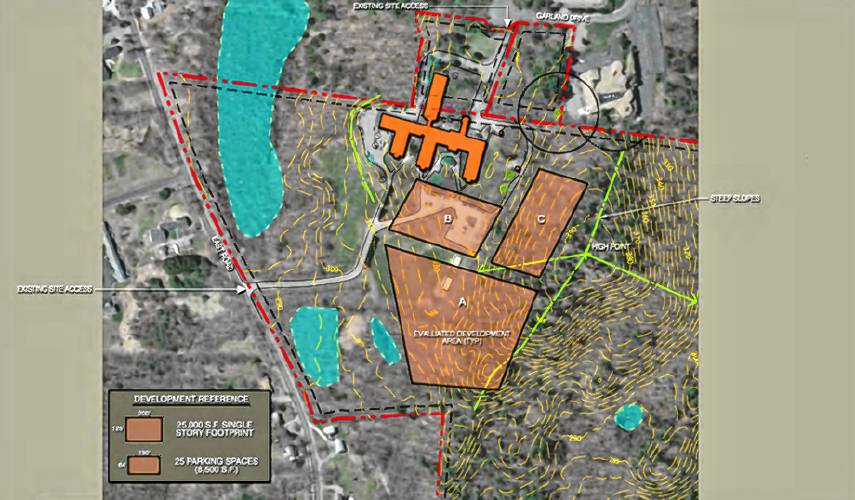Child advocate raises concerns about youth detention center plans after proposal withdrawn from Executive Council

Original plans for the new treatment facility included a 25,000-square-foot building on the Hampstead Hospital grounds. It will now be 34,000 square feet. —Courtesy
| Published: 08-07-2024 7:01 PM |
Words like institutional and hardened type of secure construction raise alarm bells for Cassandra Sanchez.
When the Office of the Child Advocate supported legislation to build a new youth detention facility, a requirement was that the center take on a residential, therapeutic focus and feel.
A contract in front of the Executive Council Wednesday – increasing design costs of the facility to $2.1 million – raises concerns for Sanchez. In fact, she was not aware of the proposal until the meeting agenda was public, despite serving on the Youth Detention Center steering committee.
“It’s alarming to me,” she said. “It’s a conversation I will definitely be following up with DHHS to understand where this is coming from and truly to push to make sure that we stick to the heart of the legislation, which is ensuring it’s a treatment facility over a youth prison.”
The contract was withdrawn at the Executive Council meeting on Wednesday after Charlie Arlinghaus, the commissioner for the state’s Department of Administrative Services, said the request was “worded poorly.”
“This is a poorly written item,” he said. “The project is not changing.”
State officials want to build a new youth detention center on the grounds of Hampstead Hospital, which will focus more on trauma-informed care and mimic a residential setting, compared to the current facility in Manchester.
Redrafting the contract – which asked for additional funding to construct a larger facility – will not delay the project, according to Arlinghaus.
Article continues after...
Yesterday's Most Read Articles
 Concord may finally buy long-closed rail line with hopes of creating city-spanning trail
Concord may finally buy long-closed rail line with hopes of creating city-spanning trail
 Free speech group, residents back Bow parents’ free speech appeal in case involving transgender athletes
Free speech group, residents back Bow parents’ free speech appeal in case involving transgender athletes
 New Cheers owners honor restaurant’s original menu while building something fresh
New Cheers owners honor restaurant’s original menu while building something fresh
 ‘Perfect fit’: Fabulous Looks Boutique shifts leadership, preserving brands and styles
‘Perfect fit’: Fabulous Looks Boutique shifts leadership, preserving brands and styles
 Ayotte vetoes bathroom bill, defeating it for second time in two years
Ayotte vetoes bathroom bill, defeating it for second time in two years
Yet the contents of the request were news to Sanchez and cause for concern.
The proposal speculated that due to an increase in more “gang members,” the juvenile correctional facility needed to increase by 36 percent from 25,000 to 34,000 square feet. Seven additional beds were needed for intake and infirmary spaces and construction would be moved from “the initial residential look and feel of the secure construction” to a “more institutional and hardened type.”
While the current Sununu Youth Services Center saw some gang activity, it’s not a new concern for the state, said Sanchez.
Historically the center treated youth who were criminally involved, without addressing mental health and behavioral issues.
“They weren’t necessarily working with youth with complex trauma and didn’t know necessarily how to treat that, which was the entire intention of looking at this from a treatment perspective,” said Sanchez.
In steering committee meetings, the group has talked extensively about the construction of the facility and how to ensure that it is a secure place that still resembles a home more than it does a prison.
Increasing the size of the facility does not help achieve that intention, she said.
“Whenever you talk about increased size, you’re now not talking about anything that feels like a home anymore and now feels like a building,” she said. “I was already a little bit worried with the bills and the way in which they were going with the design. It was starting to look a little bit institutionalized.”
Lori Weaver, the commissioner for the Department of Health and Human services, justified the size increase to the council, explaining that the facility needed more room to separate youth.
Some need to be out of sight and earshot of others for crisis intervention. Others, who’ve had an altercation need to be separated. And in other cases, the kids are in opposing gangs.
“The space has to be big enough to be able to swing to accommodate what the need is,” said Weaver.
While Gov. Chris Sununu warned councilors against further delays to the project, executive councilors agreed about the need to reconsider the proposal at their next meeting.
In the meantime, Sanchez said she will have questions for state leaders.
“We already have a large institutional building,” Sanchez said, “and we do not need to be replicating that again and putting a lot of state money into the same type of building.”







 ‘A little piece of everything I like’: New Pittsfield barbershop brings more than a haircut to downtown
‘A little piece of everything I like’: New Pittsfield barbershop brings more than a haircut to downtown NH judge decides to pause Trump’s birthright citizenship order
NH judge decides to pause Trump’s birthright citizenship order Canterbury honors ‘real heroes’ with updated Military Veterans’ Project
Canterbury honors ‘real heroes’ with updated Military Veterans’ Project Look, up in the sky! It’s… an Airstream trailer?
Look, up in the sky! It’s… an Airstream trailer?
